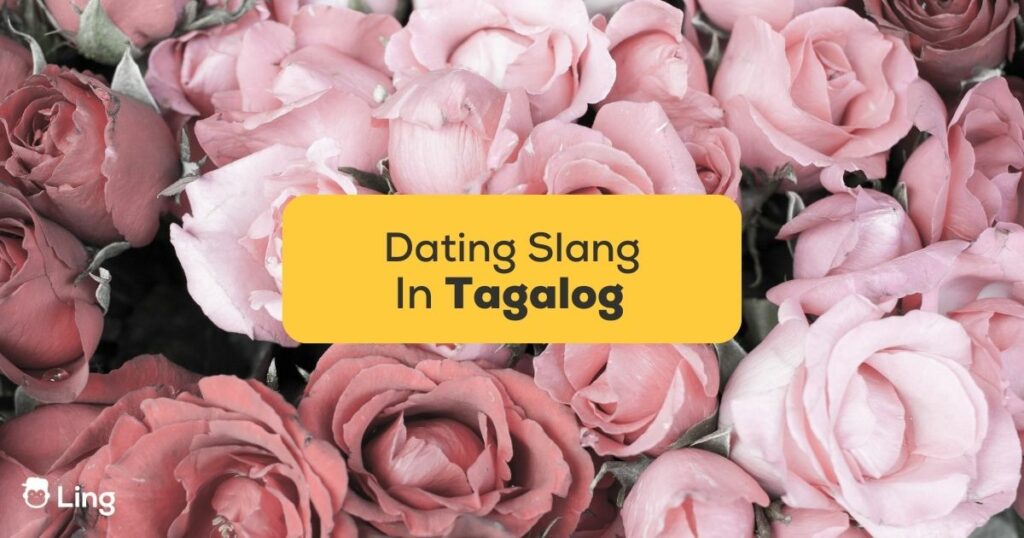Trying to decode the Tagalog dating slang of that cute Filipino crush of yours? Yeah, I’ve been there too. All those strange slang words can get confusing fast. Kilig? Basted? M.U? What do they even mean?!
When my friend Harald first started dating his Filipina girlfriend, I remember him being so totally lost in translation. He can’t help but feel weird whenever his girlfriend’s friends are giggling and chatting about feelings using all these words he doesn’t recognize. Landi this, jowa that – it was like they were speaking code!
Lucky for you, I just put together this handy guide to all the popular romantic phrases that seem to perplex every hopeful Pinoy lover. From mastering landi (flirting) tactics to avoiding horrifically awkward torpe (romantic shyness) moments, I’ll break it down so you can up your romance game, fast.
Table Of Contents
Tagalog Dating Slang
Syota
The Tagalog slang word “syota” refers to a lover, boyfriend or girlfriend, or romantic partner. It evokes the same meaning as the English slang terms “babe” or “bae” – implying someone you’re intimate with and intensely attracted to. However, do note that this has a negative connotation because it also refers to a “short time” romantic relationship.
This slang word often appears in sentences like:
- “Si Juan ay syota ko” – “Juan is my lover/boyfriend”
- “Tinanong niya ako kung mag-syota na ba kami” – “He asked me if we’re officially lovers yet”

Torpe
Being torpe means you struggle with expressing attraction openly. You may badly want to ask out your crush but feel paralyzed to act on it. So if you’re torpe, flirting and sharing your feelings are difficult despite having strong emotions or intentions.
You’ll often hear this used in phrases like:
- “Ang torpe niya kasi hindi niya masabi na gusto ka niya.” – “He’s shy because he can’t say he likes you.”
- “Excuse the torpe behavior! Kinikilig lang.” – “Excuse the shyness/awkwardness! I just have a big crush.”
M.U.
Having “mutual understanding” (M.U.) with someone means you both secretly like each other or share romantic chemistry. It refers to a connection that goes beyond friendship but lacks definition.
Some examples are:
- Frequently flirting or giving longing looks
- Getting shy or excited around each other
- Having an unspoken rapport others take note of
M.U. signifies you two likely have crushes, but neither has declared explicit intentions yet. There is a shared kilig in the air waiting for one person to make the first move toward a relationship.
In Taglish lingo, you’ll hear phrases like:
- “Parang M.U. ata sila eh.” – “Seems like they have mutual understanding/feelings for each other.”
- “Sabi ni girl BFF ko, M.U. daw kami ni crush!” – “My girl BFF said my crush and I have something mutual going on!”

Damoves
“Damoves” comes from the phrase “making moves” in English. It refers to confidently taking the initiative to flirt and escalate intimacy with someone you desire.
Common phrases include:
- “Dumadamoves yata sayo si Rico ah!” – “Looks like Rico is putting the moves on you!”
- “Mag damoves ka na bago ka pa mahuli.” – Go on and make your move before it’s too late”
LDR
The abbreviated slang term “LDR” stands for long distance relationship – conveyed in Tagalog as “relasyong pang malayong distansya.” An LDR implies two people wanting commitment and exclusivity despite living geographically apart.
You’ll often hear this word in sentiments like:
- “Miss na kita, mahal! Ang hirap ng LDR.” – “I miss you, love! LDRs are so hard.”
- “LDR kami ni Jonathan.” – “Jonathan and I are in a long distance relationship.”
AFAM
The slang acronym “AFAM” or “a foreigner assigned to Manila” playfully refers to the recent trend of expats and overseas professionals moving to work in the Philippines, especially the Metro Manila area. You might hear lighthearted phrasing like:
- “Maraming AFAM sa BGC na naghahanap ng mga Filipina!” – “There are lots of foreigners in BGC looking for Filipina girlfriends!”
- “Matagal na siyang AFAM pero bihasa na sa kultura natin.” – “He’s been an expat here awhile and already adept in our culture.”

Jowa
The term “jowa” is one of the most popular Tagalog slang words, serving as the catch-all for lover, girlfriend, boyfriend, or simply one of the terms of endearment today. It’s the casual way of referring to someone you’re committed to and exclusive with romantically.
You’ll hear affectionate phrases like:
- “Jowa ko si Genine at sobrang love ko siya.” – “Genine is my lover/girlfriend, and I love her so much.”
- “Sinong lucky guy ang bagong jowa mo girl?” – “Who’s the lucky guy that’s your new boyfriend?”
Bebe Time
Into a romantic relationship? The playful phrase “bebe time” stems from the Spanish term of endearment, “bebé,” meaning baby. In Tagalog slang, bebe time refers to carving out private, intimate time together with your jowa/syota/romantic partner.
You’re likely to hear cheeky invitations like:
- “Samahan mo ko manood ng movie mamaya para may bebe time naman tayo.” – “Let’s watch a movie later so we can have some couple time.”
- “Miss na kita! Kelan tayo magkaka-bebe time?” – “I miss you! When can we have some one-on-one time?”

Basted
The all-too-familiar slang word “basted” stems from the English word “busted” and encapsulates that universal feeling of romantic rejection or failure. When you get basted, it means receiving the harsh letdown of a relationship not progressing after putting yourself out there.
You’ll hear dramatic sentiments like:
- “Basted ako kay Anna nang hingian ko siya ng second date!” – “I got rejected when I asked Anna out again!”
- “Grabe, bigla akong binasted ng girlfriend ko through text lang!” – “Wow, my girlfriend suddenly dumped me over just a text!”
So in Pinoy dating culture, getting basted signals a often painful end, one that may take some kilig rebounds to recover from. It evokes empathy, comfort, and camaraderie among friends.
Kabit
The slang word “kabit” refers to a bold, taboo role – an illicit lover having an affair with someone already in a committed relationship. Also called “the other man” or “the other woman,” being kabit implies secretly being an unauthorized romantic rival competing with an existing girlfriend/boyfriend. It connotes moral mischief and complicit homewrecking.
Some dramatic example phrases are:
- “May kabit pala ang boyfriend ni Anna kaya sila nag-break!” – “Anna broke up with her boyfriend because it turns out he had another lover!”
- “Alam ng lahat na kabit lang siya dahil may asawa na yung lalake.” – “Everyone knows she’s just the other woman since that man has a wife already.”
L.Q.
The letters “L.Q.” are shorthand for the English phrase “lover’s quarrel” – conveyed in Tagalog as “away ng magkasintahan.” Having a modern-day L.Q. moment signifies going through a rough patch of conflict and tension between romantic partners.
You’ll hear this word in sentences like:
- “Bakit ang bilis mong ma-badtrip – LQ na naman ba kayo ni Kara?” – “Why are you in a bad mood so early – having issues with Kara again?”
- “Ayaw tumanggap ng calls si Rico, baka L.Q phase lang ‘to.” – “Rico isn’t taking my calls, this is probably just an L.Q. phase.”
What’s Next For Your Tagalog Romance?
So there you have it – the complete starter guide to navigating the often perplexing realm of Tagalog dating slang, from torpe to jowa. Hopefully, after reading this guide, you’ve unlocked a better understanding of connecting with potential partners in the Philippines!
Whether you’ll soon meet your Pinoy soulmate, already have a steady yet still face hilariously awkward slang barriers, or just love the melodramatic entertainment of local teleseryes, taking these key terms to heart helps smooth rapport and strengthen bonds.
Want to learn more Tagalog words to WOW your Filipina friend? For supplementary help, as you continue your exciting journey of understanding intricate Filipino passion speak, I highly recommend downloading the convenient Ling app.
With Ling’s easy Tagalog quizzes and tooltips tailored to romantic phrases – plus quick access to expert lessons – you’ll start fluently landing lines, resolving misunderstandings, and feeling that signature-kilig in no time.
Salamat for reading, and best of luck kindling that Pinoy romance spark into a shining new relationship!



































































